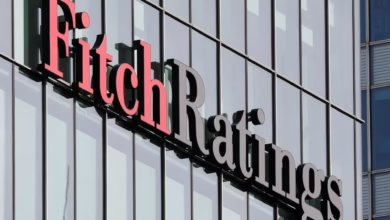
Ghana’s central bank cut its key interest rate to 27% from 29%, a larger-than-expected reduction, as inflation in the country slows and is projected to decrease further.
The decision, announced by Governor Ernest Addison, surprised economists and marks the steepest cut since March 2018. None of the economists polled by Bloomberg had anticipated such a significant decrease.
Inflation in Ghana has slowed for five consecutive months, falling to 20.4% in August from 25.8% in March. The central bank expects inflation to continue easing toward its year-end target of 13% to 17%, and potentially reach 6% to 10% by the end of 2025, barring unforeseen shocks.
Also Read: Ghana Secures Debt Relief, to Restructure $13 Billion Eurobond Debt
This rate cut comes ahead of Ghana’s presidential elections in December, where Vice President Mahamudu Bawumia faces strong opposition from John Dramani Mahama amid public frustration over the economy.
Ghana’s economy grew 6.9% in the second quarter of 2024, its strongest performance in five years, as the country emerges from debt restructuring following its 2022 default and a $3 billion IMF bailout.






I like what you guys are up too. Such intelligent work and reporting! Keep up the superb works guys I have incorporated you guys to my blogroll. I think it’ll improve the value of my web site :).
Howdy! Someone in my Facebook group shared this website with us so I came to give it a look. I’m definitely enjoying the information. I’m bookmarking and will be tweeting this to my followers! Excellent blog and excellent design and style.
Hello! I could have sworn I’ve been to this blog before but after browsing through some of the post I realized it’s new to me. Anyways, I’m definitely happy I found it and I’ll be book-marking and checking back frequently!
Great post, I believe people should acquire a lot from this website its rattling user friendly.
you are really a good webmaster. The website loading speed is amazing. It seems that you’re doing any unique trick. Also, The contents are masterwork. you’ve done a wonderful job on this topic!
Just wish to say your article is as astonishing. The clearness in your post is just excellent and i could think you are a professional in this subject. Well together with your permission allow me to take hold of your feed to keep updated with drawing close post. Thank you one million and please continue the rewarding work.
Thank you so much for giving everyone a very breathtaking possiblity to discover important secrets from this site. It really is so fantastic and as well , jam-packed with a lot of fun for me and my office friends to search the blog a minimum of 3 times per week to learn the latest guidance you will have. And indeed, we are at all times fulfilled concerning the fantastic pointers you give. Certain 2 points in this post are in reality the very best I’ve had.
Great awesome things here. I am very glad to look your article. Thanks a lot and i’m having a look forward to touch you. Will you please drop me a e-mail?
Hey! Do you know if they make any plugins to help with SEO? I’m trying to get my blog to rank for some targeted keywords but I’m not seeing very good gains. If you know of any please share. Thanks!
I do believe all the concepts you’ve introduced on your post. They are very convincing and can certainly work. Nonetheless, the posts are too short for novices. May just you please prolong them a little from next time? Thanks for the post.
There is noticeably a bundle to know about this. I assume you made certain good factors in options also.
Hi there! I just wanted to ask if you ever have any issues with hackers? My last blog (wordpress) was hacked and I ended up losing several weeks of hard work due to no data backup. Do you have any solutions to prevent hackers?
The subsequent time I learn a weblog, I hope that it doesnt disappoint me as much as this one. I mean, I do know it was my option to read, but I truly thought youd have something interesting to say. All I hear is a bunch of whining about something that you might fix in case you werent too busy in search of attention.
I have been reading out a few of your posts and i can state pretty good stuff. I will definitely bookmark your blog.
very good publish, i definitely love this web site, carry on it
You really make it seem so easy with your presentation but I find this topic to be really something which I think I would never understand. It seems too complicated and extremely broad for me. I’m looking forward for your next post, I will try to get the hang of it!
You really make it seem so easy together with your presentation however I find this topic to be actually one thing that I feel I would never understand. It kind of feels too complex and very extensive for me. I’m taking a look ahead for your next post, I will try to get the grasp of it!
I have been surfing online greater than 3 hours lately, yet I by no means discovered any attention-grabbing article like yours. It is pretty price enough for me. In my view, if all webmasters and bloggers made excellent content material as you did, the internet will be much more helpful than ever before.
Some truly excellent info , Glad I detected this.